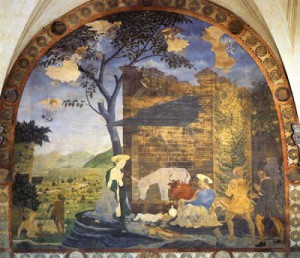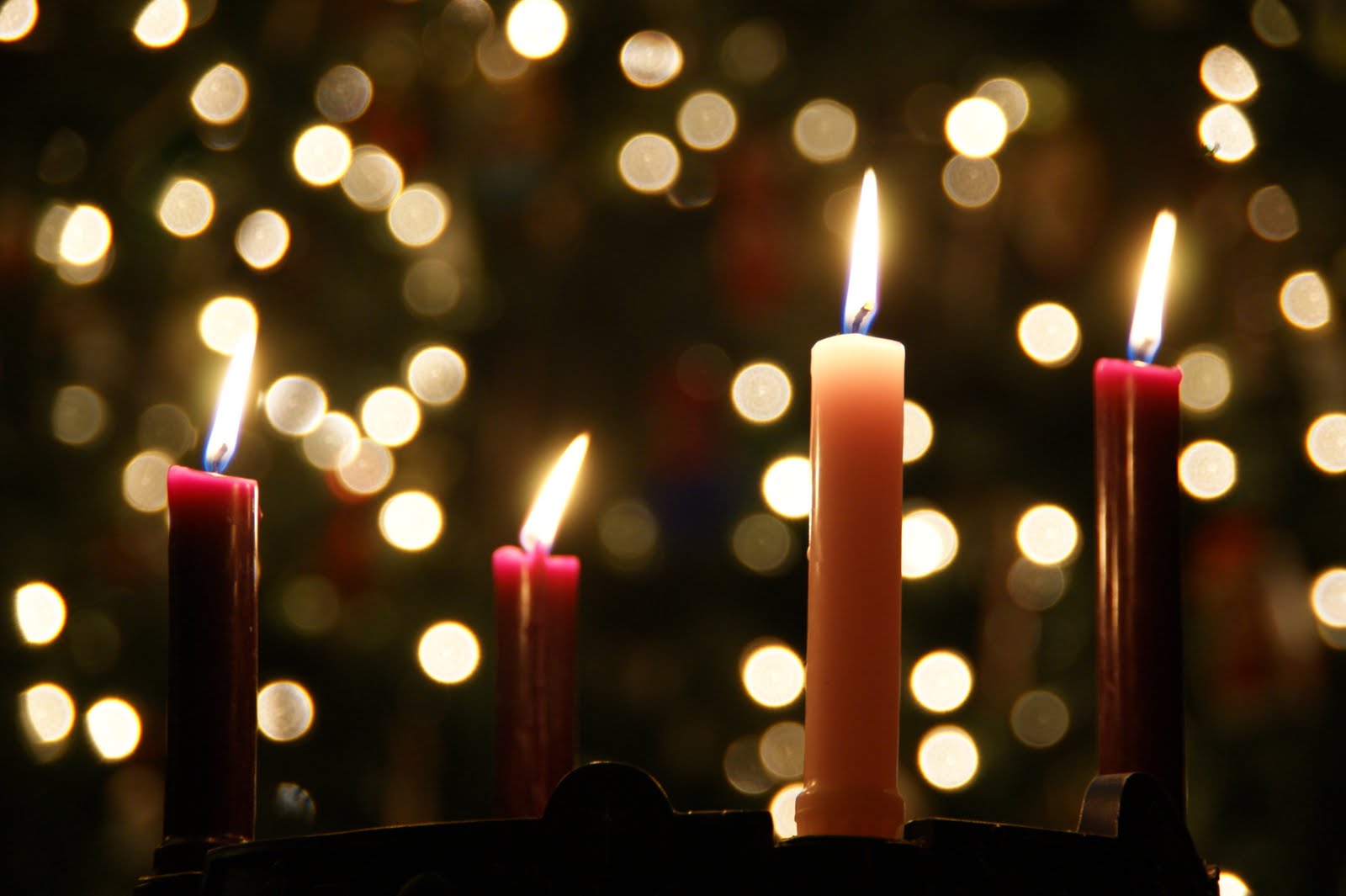Readings:
Isaiah 2:1-5
Psalm 122:1-9
Romans 13:11-14
Matthew 24:37-44 (see also “The Gospel of Fulfillment”)
Chants
Scott Hahn with David Scott
Jesus exaggerates in today’s Gospel when He claims not to know the day or the hour when He will come again. He occasionally makes such overstatements to drive home a point we might otherwise miss (see Matthew 5:34; 23:9; Luke 14:26).
His point here is that the exact “hour” is not important. What is crucial is that we not postpone our repentance, that we be ready for Him – spiritually and morally – when He comes. For He will surely come, He tells us – like a thief in the night, like the flood in the time of Noah.
In today’s Epistle, Paul too compares the present age to a time of advancing darkness and night.
Though we sit in the darkness, overshadowed by death, we have seen arise the great light of our Lord who has come into our midst (see Matthew 4:16; John 1:9; 8:12). He is the true light, the life of the world. And His light continues to shine in His Church, the new Jerusalem promised by Isaiah in today’s First Reading.
In the Church, all nations stream to the God of Jacob, to worship and seek wisdom in the House of David. From the Church goes forth His word of instruction, the light of the Lord – that all might walk in His paths toward that eternal day when night will be no more (see Revelation 22:5).
By our Baptism we have been made children of the light and day (see Ephesians 5:8; 1 Thessalonians 5:5-7). It is time we start living like it – throwing off the fruitless works of darkness, the desires of the flesh, and walking by the light of His grace.
The hour is late as we begin a new Advent. Let us begin again in this Eucharist.
As we sing in today’s Psalm, let us go rejoicing to the House of the Lord. Let us give thanks to His name, keeping watch for His coming, knowing that our salvation is nearer now than when we first believed.
The Gospel of ‘Fulfillment’
With the First Sunday in Advent we begin a new “cycle” (Cycle A) of the Church’s Liturgical Year. Sunday by Sunday for the next year we’ll be reading the Gospel of Matthew.
Matthew’s Gospel is a prime example of what St. Augustine was talking about when he said: the New Testament is concealed in the Old and the Old Testament is revealed in the New.
You can’t read Matthew without having your ear tuned to the Old Testament. He quotes or alludes to the Old Testament an average of four or five times per chapter – or more than 100 times in his Gospel.
Matthew writes this way because he wants his fellow Israelites to see that their Old Covenant with God has been “fulfilled” in Jesus. Get used to words like “fulfill” and “fulfillment” – you’re going to hear them repeatedly in Matthew’s gospel.
On the Fourth Sunday of Advent, for instance, Matthew explains how Mary is found with child: “All this took place to fulfill what the Lord had said through the prophet: ‘Behold the virgin shall be with child and bear a son, and they shall call him Emmanuel” (see Matthew 1:22-23).
Again, on Palm Sunday, when He is arrested in the garden, Jesus says: “All this has come to pass that the writings of the prophets may be fulfilled” (see Matthew 26:54,56).
The numerous “fulfillments” Matthew tells us about are intended to signal one thing – that in Jesus, God is finally delivering on the promises He made throughout salvation history.
Pierre de Blois (c.1130-1211)
There are three comings of Christ: the first, in the flesh; the second, in the soul; the third, at the judgement.
The first took place at midnight, according to those words of the Gospel: “At midnight there was a cry: ‘Behold, the bridegroom!’” (Mt 25,6). This first coming has already happened because Christ “has appeared on earth and moved among men,” (Bar 3,38).
At the present time we exist in the second coming, provided we ourselves are such as he is able thus to come to. For he has said that, if we love him, he will come to us and make his dwelling with us (Jn 14,23).
This second form of coming is thus something mingled with uncertainty where we are concerned. For who but the Spirit of God knows who they are who belong to God (1Cor 2,11)? Those know well his coming whose longing for heavenly things enraptures them out of themselves, yet they “do not know where he comes from or where he goes,” (Jn 3,8).
As for the third coming: it is very certain that it will come to pass, very uncertain when it will come to pass, since nothing is more certain than death, nothing more uncertain than the day of our death.
“When people are saying, ‘Peace and security,’ then sudden disaster comes upon them, like labour pains upon a pregnant woman, and they will not escape,” (1Thes 5,3). And so, the first coming was hidden and in lowliness; the second is mysterious and full of love; the third will be swift and terrible.
In his first coming, Christ was judged unjustly by men; in the second, he shows us justice by his grace; in the last, he will judge all things with equity. He is Lamb in his first coming, Lion at the last, a Friend full of gentleness in the second.
St. Aelred of Rievaulx
Sermon for the Advent of the Lord (PL 195, 36 ; PL 184, 81)
This season of Advent represents the two comings of the Lord: in the first place, the sweetest coming of “the fairest of the children of men” (Ps 45[44],3) of the “Desired of all nations” (Hg 2,8 Vg), of that Son of God who has visibly manifested his long-awaited presence in the flesh to the world, so ardently desired by all our holy forefathers. This is the coming whereby he came into the world to save sinners. But this season also calls to mind the coming we are waiting for with certain hope and should often remember with tears: that which will take place when the same Lord appears manifestly in his glory…: that is to say, on the day of judgement when he will come openly to judge. The first coming was known only to few, but in the second he will manifest himself to the just and to sinners, as the prophet declares: “And all flesh shall see the salvation of God” (Is 40,5; Lk 3,6)…
So let us follow the example of those holy forefathers, dearest brethren; let us relive their desire and kindle our minds with love and desire for Christ. As you know well, the celebration of this season was instituted to renew that desire within us that the fathers of old had for the first coming of the Lord and so that, through their example, we might also learn to long for his return. Think of all the good our Lord accomplished for our sakes at his first coming. How much more will he not accomplish when he comes again! This thought will make us love all the more his former coming and all the more desire his return…
If we would experience peace at his future coming, let us strive to welcome his former coming with faith and love. Let us remain faithfully in those works he made known to us and taught us then. Let us nurture love for our Lord in our hearts and, through love, desire, so that when the Desired of the nations comes we may look on him in all confidence.

